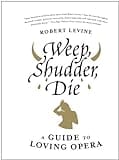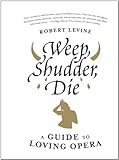Weep, Shudder, Die
Published:
Weep, Shudder, Die

Metadata
- Author: Robert Levine
- Full Title: Weep, Shudder, Die
- Category: #books
Highlights
- This book is also for people who want smarter babies, the ability to earn big bucks in their spare time, to take advantage of foreclosed properties, and to learn a foreign language and have flatter abs without leaving the comfort of their homes. (Location 115)
- Opera, simply, is sung drama, with the story told through both voices and instruments and often involving costumes and sets. (Location 120)
- A group of late-sixteenth- and early-seventeenth-century Italians with money, status, and ideas believed that the plays of Greek antiquity, to which they aspired (the good old days?), had been sung rather than spoken. In fact, this belief was incorrect, but by the time everyone found out, opera had already taken hold, and an entirely new art form—and form of entertainment—had been invented. (Location 122)
- opera was made up, essentially, of two types of singing, the first being recitatives (Location 133)
- aria. These have tunes you can recognize (after a listen or two, as with any music), are more structured, stop the action, and focus on a particular feeling, event, or situation. (Location 140)
- We like to weep at “art”; it’s a good way to reach inside without feeling we’re getting too personal. A shared catharsis is a good thing, and in the case of opera, it is both diverting and private. (Location 159)
- Consider opera entirely as metaphor, and its very artificiality will become one of its shining virtues. (Location 318)
- emotions are capable of being pinpointed in an aria or duet, say, not only by word but by sound of voice, range and reach of voice, and orchestral commentary/accompaniment. It is here that opera is actually hyperreal and larger than life. More about this later. (Location 346)
- “When someone gets stabbed in an opera, instead of bleeding, he sings.” I’m not sure who said it first, but that says it all. (Location 349)
- The truth is that opera is surreal and artificial and in order to appreciate either surreality or artifice you normally have to know what art and reality are. (Location 421)
- Opera becomes urgent only once you love it; like anything you’re learning—or that is worth exploring—it doesn’t open itself completely the first time. (Location 433)
- Like chicken soup, opera is good for you. (Location 444)
- What makes us so love Figaro, Così Fan Tutte, Don Giovanni, and The Magic Flute is what makes us love all great works: they are beautiful and timeless, funny and profound, sublime and ridiculous. (Location 1159)
- The finale, “Esci, omai, garzon malnato”: this is the most stupendously constructed finale to any act in opera. It begins as a duet, then becomes a trio, then a quartet, and so on, each time changing tempo, and for twenty minutes gets more and more complicated and funnier and funnier. For sheer forward propulsion and wit, it has never been equaled. Act III: The (Location 1206)
public: true
title: Weep, Shudder, Die longtitle: Weep, Shudder, Die author: Robert Levine url: , source: kindle last_highlight: 2021-12-28 type: books tags:
Weep, Shudder, Die

Metadata
- Author: Robert Levine
- Full Title: Weep, Shudder, Die
- Category: #books
Highlights
- This book is also for people who want smarter babies, the ability to earn big bucks in their spare time, to take advantage of foreclosed properties, and to learn a foreign language and have flatter abs without leaving the comfort of their homes. (Location 115)
- Opera, simply, is sung drama, with the story told through both voices and instruments and often involving costumes and sets. (Location 120)
- A group of late-sixteenth- and early-seventeenth-century Italians with money, status, and ideas believed that the plays of Greek antiquity, to which they aspired (the good old days?), had been sung rather than spoken. In fact, this belief was incorrect, but by the time everyone found out, opera had already taken hold, and an entirely new art form—and form of entertainment—had been invented. (Location 122)
- opera was made up, essentially, of two types of singing, the first being recitatives (Location 133)
- aria. These have tunes you can recognize (after a listen or two, as with any music), are more structured, stop the action, and focus on a particular feeling, event, or situation. (Location 140)
- We like to weep at “art”; it’s a good way to reach inside without feeling we’re getting too personal. A shared catharsis is a good thing, and in the case of opera, it is both diverting and private. (Location 159)
- Consider opera entirely as metaphor, and its very artificiality will become one of its shining virtues. (Location 318)
- emotions are capable of being pinpointed in an aria or duet, say, not only by word but by sound of voice, range and reach of voice, and orchestral commentary/accompaniment. It is here that opera is actually hyperreal and larger than life. More about this later. (Location 346)
- “When someone gets stabbed in an opera, instead of bleeding, he sings.” I’m not sure who said it first, but that says it all. (Location 349)
- The truth is that opera is surreal and artificial and in order to appreciate either surreality or artifice you normally have to know what art and reality are. (Location 421)
- Opera becomes urgent only once you love it; like anything you’re learning—or that is worth exploring—it doesn’t open itself completely the first time. (Location 433)
- Like chicken soup, opera is good for you. (Location 444)
- What makes us so love Figaro, Così Fan Tutte, Don Giovanni, and The Magic Flute is what makes us love all great works: they are beautiful and timeless, funny and profound, sublime and ridiculous. (Location 1159)
- The finale, “Esci, omai, garzon malnato”: this is the most stupendously constructed finale to any act in opera. It begins as a duet, then becomes a trio, then a quartet, and so on, each time changing tempo, and for twenty minutes gets more and more complicated and funnier and funnier. For sheer forward propulsion and wit, it has never been equaled. Act III: The (Location 1206)